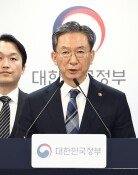[Editorial] Honest Economic Promises Needed
[Editorial] Honest Economic Promises Needed
Posted December. 13, 2007 03:07,
President Roh Moo-hyun lauded the administrations economic achievements yesterday when he presided over the administrations last National Economic Advisory Council meeting. It was not the first time that the president has left a scar in the minds of the people who have to endure their economic plight. Not long before, Roh even said, The administrations economic policy can serve as an example. During the five years under the Roh administration, the growth rates of the economy have been below world average growth rates, and the number of jobs created in Korea has barely reached half of expectations.
These numerical aspects are problematic. Yet more fundamental problems lie in the fact that investment is shrinking and, as a result, the economys growth engine is faltering.
In a report titled 2007 Foreign Direct Investment Confidence Index published on December 11 by AT Kearney, a global management consulting firm, Korea came in 24th among 47 countries. Korea ranked 18th in 2003, 21st in 2004 and 23rd in 2005. This year Korea ranked below Vietnam, Malaysia and Indonesia.
Former economic ministers, including former Prime Minister Nam Deok-u, expressed their concern in a statement early this week, saying, South Korea is facing four-pronged economic difficulties of low growth, high prices, high interest rates, and a worsening current account balance. The ministers pointed out, The general weakening of Koreas economic fundamentals is a major concern. Clearly, the economic reality is far from the complacent view of the President.
Polls make it clear that the people see the economy in general, and job creation in particular, as the major issue in the upcoming presidential election. Economic growth by stimulating investment is the soundest way to create more jobs. The new government needs to endeavor to ensure a business-friendly environment with the easing of regulations. South Korea needs to follow the world-wide trend of small government, big market. Ensuring economic growth is a sure way to narrow Koreas widening income gap.
The presidential candidates are scheduled to discuss public policy issues concerning the economy, labor, welfare, and science on December 16. Up until now, we often hear, More welfare, less taxes from them. But a candidate must not solicit voters with hollow promises. Just like French President Nicolas Sarkozy, who governs under the principle of small government, big market, candidates need to present honest economic visions that require efforts from the people. It is time for the nation to continue to create more jobs and to work, not a time to stop doing so.







